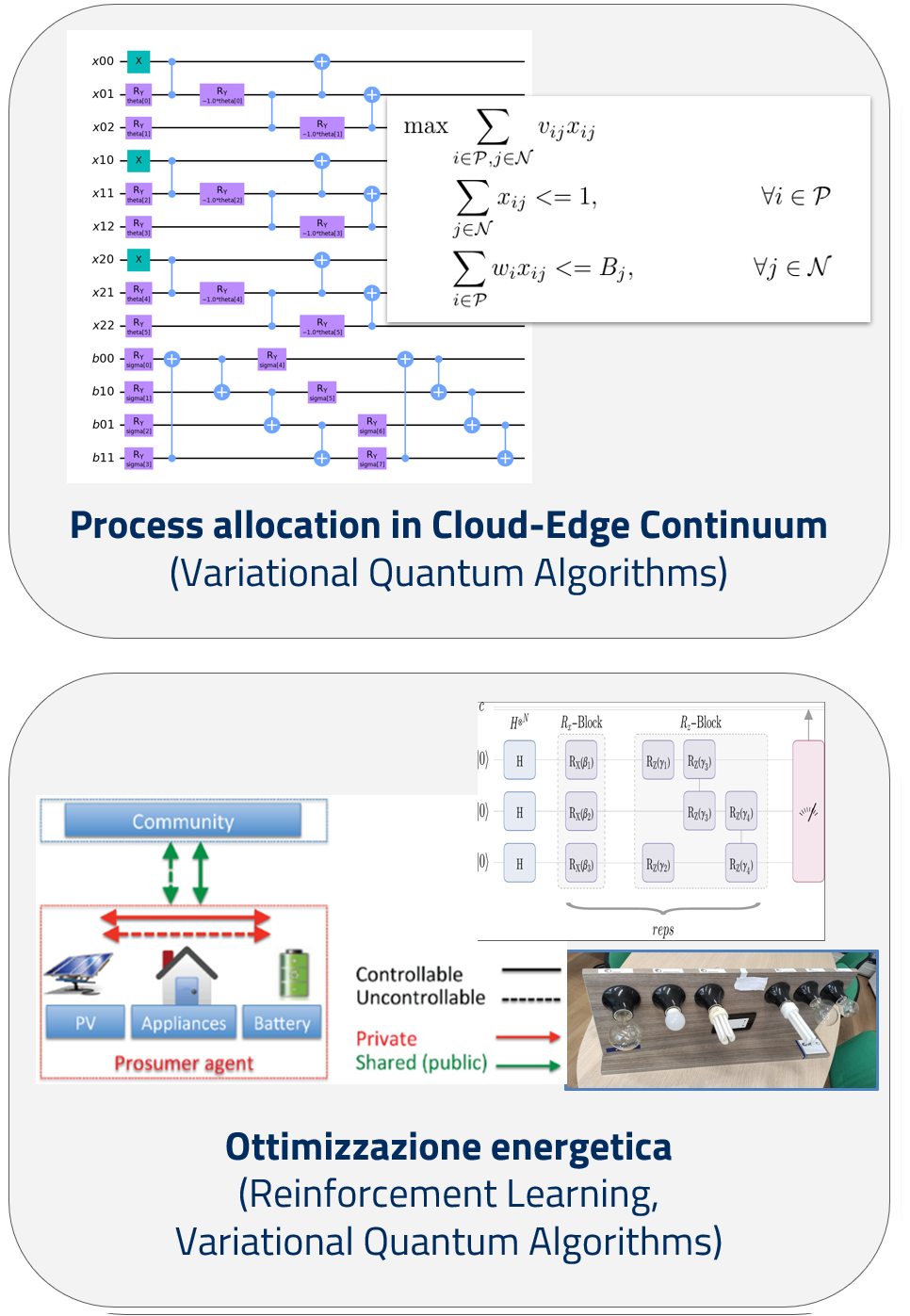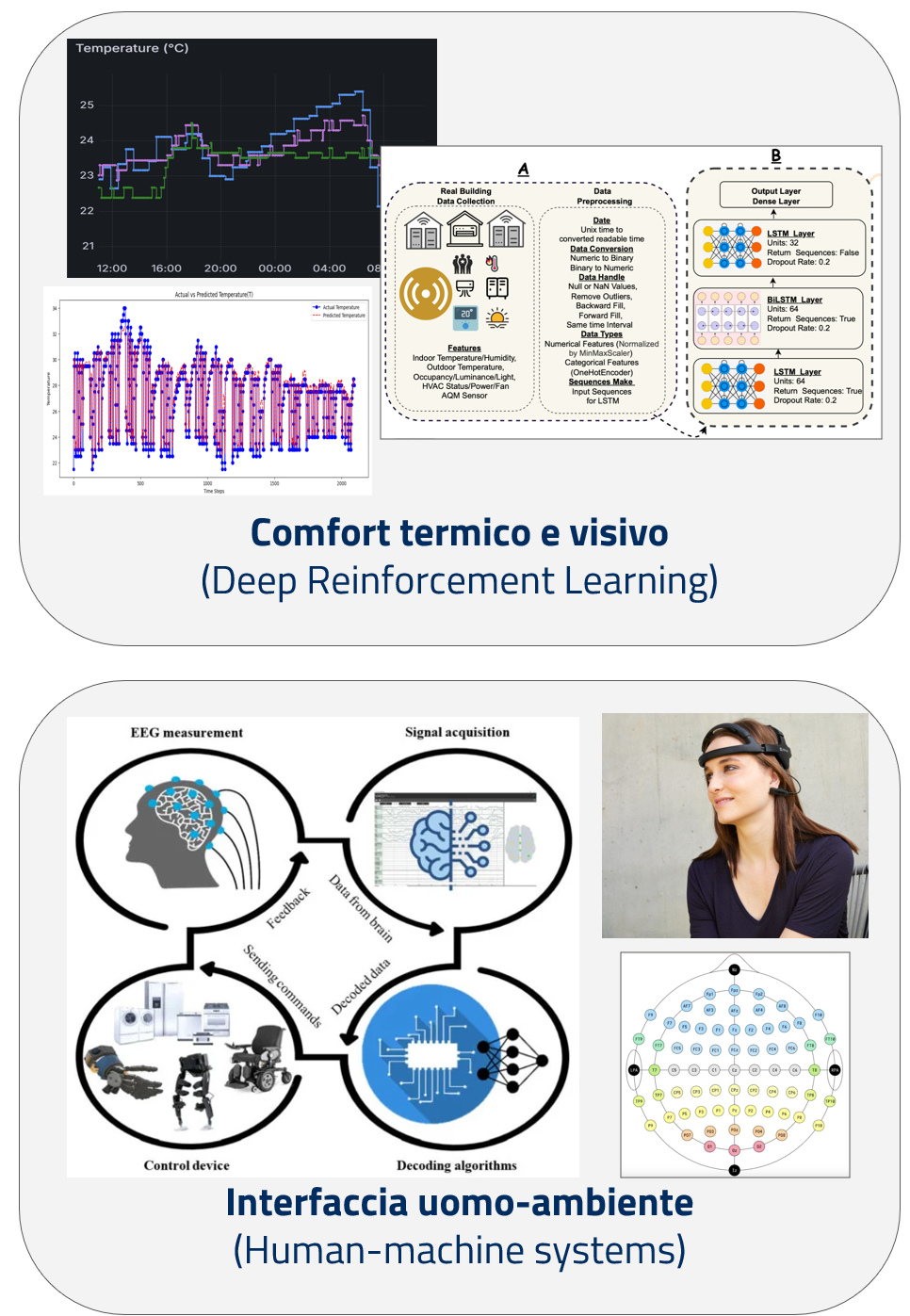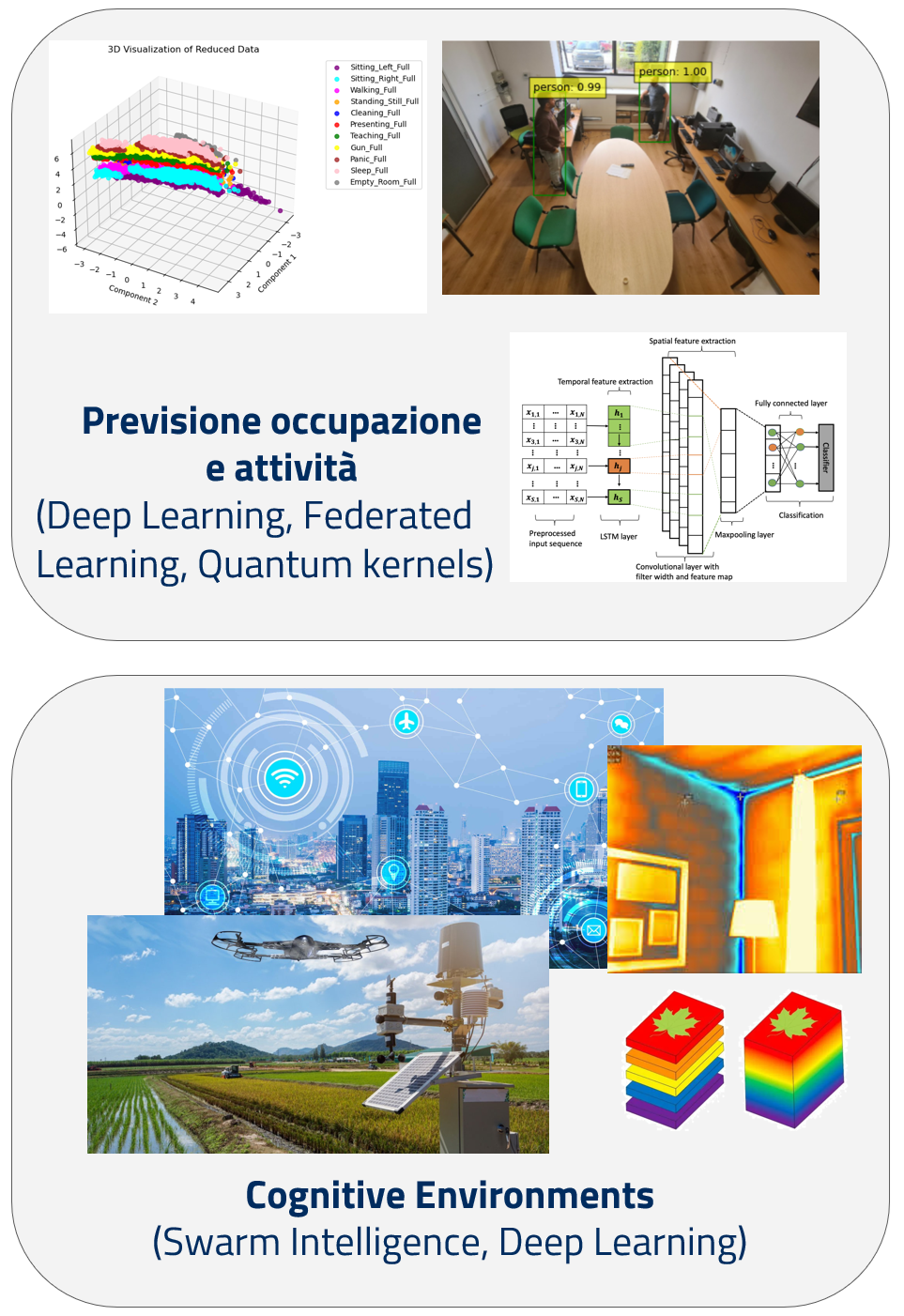
| The Edge Intelligence Group focuses on the development of cognitive environments based on the Internet of Things (IoT), exploring innovative methodologies, architectures, and tools. These environments are capable of learning, self-managing, and autonomously adapting. The group works with advanced technologies such as deep learning, swarm intelligence, and quantum algorithms, applying them in areas like indoor comfort, security, sustainability, smart agriculture, and human-environment interaction. They utilize cutting-edge equipment to monitor and control environments. | |
| Edge Intelligence Group | ||||
| F. Cicirelli, F. D’Amore, A.F. Gentile, E. Greco, A. Guerrieri, M.B. Islam, I. Khan, Q. Li, L. Mariani, C. Mastroianni, F. Mauro, M. Micieli, L. Rizzo, L. Salatino, R. Varchera, A. Vinci |
||||
| The Edge Intelligence Group is dedicated to studying methodological approaches, architectures, tools, and models for the development of cognitive environments based on the Internet of Things (IoT). A cognitive environment is an augmented environment capable of exhibiting self-learning, self-management, and self-adaptation behaviors. Our work aims to contribute to the design and implementation of innovative solutions that can revolutionize the way we interact with our surroundings and enhance the quality of life. | ||||
| Research Activities and Applied Algorithms | ||||
| Our activities focus on highly relevant research areas. We design and develop advanced learning methodologies and algorithms, including deep learning, reinforcement learning, swarm intelligence, and quantum algorithms, within an edge/cloud continuum framework. We contribute to innovation in application fields such as indoor comfort management, security, sustainability, smart agriculture, digital archaeology, and advanced human-environment interaction. | ||||
|
||||
| Infrastructure and Software | ||||
We have developed an advanced platform that accelerates the development of smart applications while ensuring high security standards. We leverage the most innovative technologies, both in hardware and software, utilizing sophisticated tools for efficient monitoring and management of both indoor and outdoor spaces.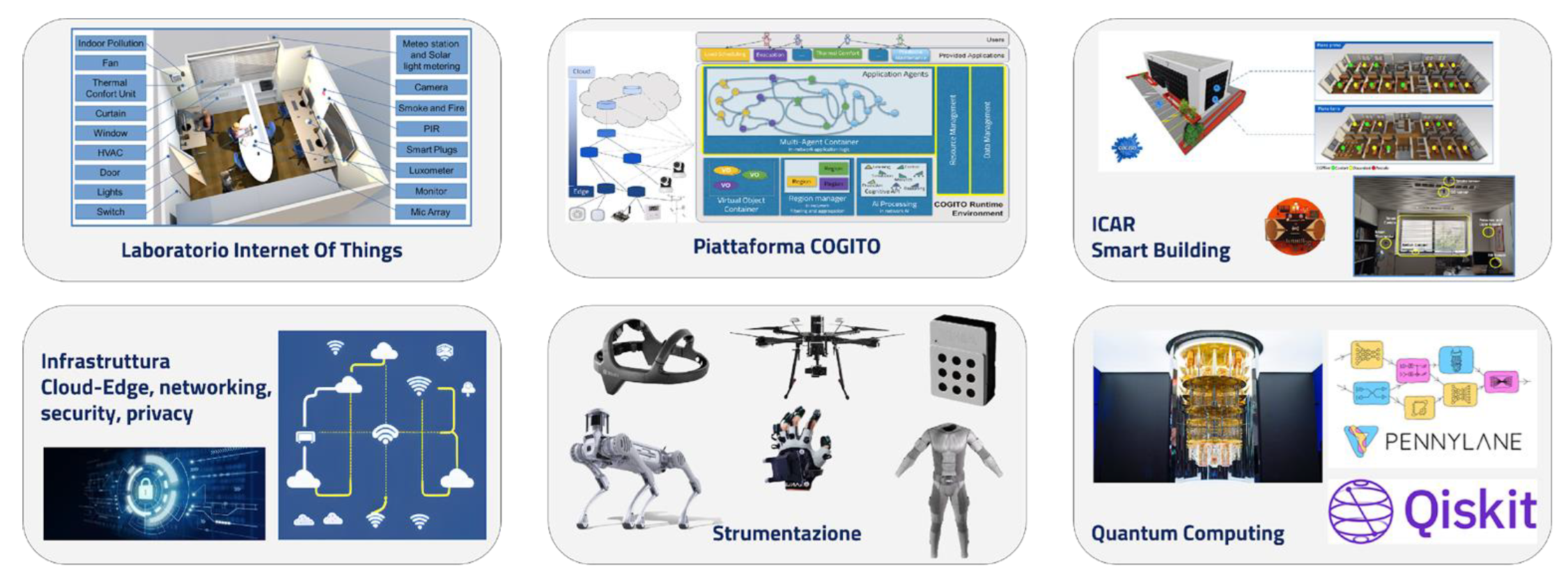 |
||||


FRANCESCO D’AMORE

GIANCARLO FORTINO
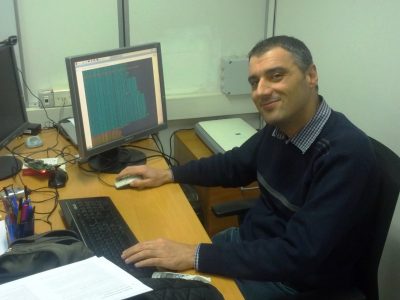
ANTONIO FRANCESCO GENTILE

EMILIO GRECO

ANTONIO GUERRIERI

MD BABUL ISLAM

QIMENG LI

NICOLINO LO GULLO

LUCA MARIANI

CARLO MASTROIANNI

FEDERICA MAURO

MASSIMO MICIELI

LUIGI RIZZO

LUCA SALATINO

JACOPO SETTINO

ROSA VARCHERA

ANDREA VINCI
- URAN – Urban Intelligence: Advanced approaches for transitions in urban environments
- ToSCoB: Towards Sustainable Cognitive Buildings
- TIRS: Industrial Transition and Resilience of Post-Covid19 Societies
- K4H – Kit for Health
- INSIDER: INtelligent ServIce Deployment for advanced cloud-Edge integRation
- HPC_SPOKE_6 – Nazional HPC Big Data Quantum Computing
- COGITO – A COGnItive dynamic sysTem to allOw buildings to learn and adapt
- COCOWEARS
- BEDD: Bridge Early Damage Detection
- AQUA-PREDICT: an AI-based methodological approach in the Edge/Cloud continuum for Urban Water distribution Predictive maintenance
- ALCMAEON : A Multidimensional Big Data AnaLytiCs PlatforM for Supporting Predictive Analysis and Mining over Clinical and MEdical (Big) Data ON Alzheimer’s Disease Patients
Active Projects:
- FOE “STRIVE le Scienze per le TRansizioni Industriale, Verde ed Energetica” Sottoprogetto ToSCoB (Franco Cicirelli, € 77k)
- PRIN 2022 A framework for COntinuum COmputing WEARable Systems, COCOWEARS (Antonio Guerrieri, € 94k)
- PRIN 2022 INSIDER: INtelligent ServIce Deployment for advanced cloud Edge integRation (Andrea Vinci, € 84k)
- PNRR a cascata da partenariato esteso RETURN AI based methodological approach in the Edge/Cloud continuum for Urban Water distribution Predictive maintenance, Aquapredict (Franco Cicirelli, € 88k)
- Progetto Nazionale Ministero dell’Ambiente “Reti Speciali” (D.LGS. 155/2010). Responsabile della linea di attività WPD.2 “Sistema informativo Reti speciali” (Francesco D’amore)
- Convenzione Operativa ICAR/CREA (Franco Cicirelli)
Partnerships:
- MISE A Multidimensional Big Data AnaLytiCs PlatforM for Supporting Predictive Analysis and Mining over Clinical and MEdical (Big) Data ON Alzheimer’s Disease Patients (ALCMAEON)
- PNRR a cascata da partenariato esteso RETURN Bridge early damage detection, BEDD
Submitted Projects:
- POR TOGETHER (Andrea Vinci, € 210k), POR CALARCAIDE (Franco Cicirelli, € 248k), POR SIGEMOSI (Antonio Guerrieri, € 214k)
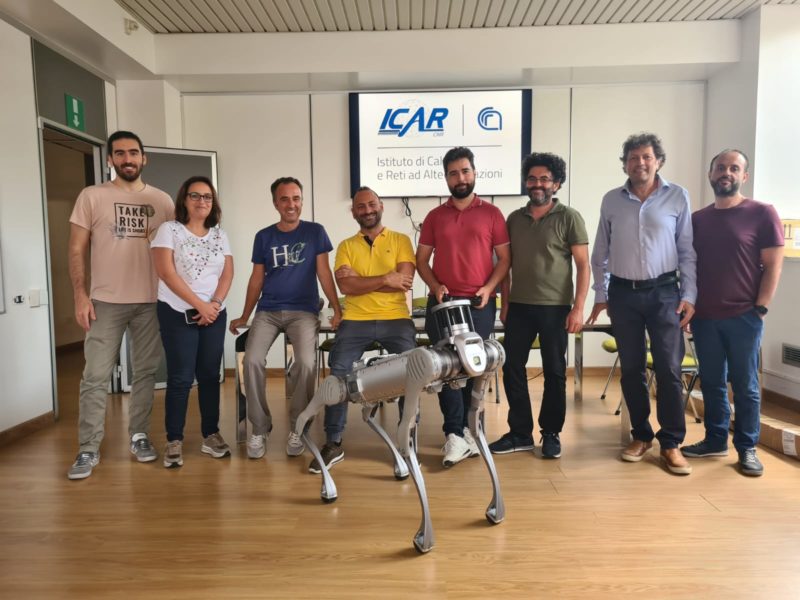
The EIG group at the Rende site, within the University of Calabria, has recently strengthened its commitment to technological innovation by equipping itself with cutting-edge instruments to enhance advanced research and applications in the industrial and medical fields. The synergy between ICAR and the University of Calabria contributes to a stimulating research environment, fostering the exchange of ideas and collaboration among researchers.
Among the most innovative technologies introduced, the Unitree B2 quadruped robot stands out, a state-of-the-art mobile robotic system capable of operating autonomously in complex environments. This technology is applied in numerous fields, from advanced robotics to automation, and represents a valuable resource for experimental research.
The group has also adopted the portable EEG headset, a device designed for real-world applications that allows real-time monitoring of brain activity. This technology opens up new frontiers in human-machine interfaces, enabling advanced interactions in dynamic and complex environments.
Another innovation includes the latest generation smartglasses, such as the Magic Leap 2 Developer Pro and the Epson Moverio BT-45CS. These smart glasses offer augmented reality features and integrate voice commands, head, eye, and hand gesture tracking, making them extremely versatile tools for industrial and medical applications. In particular, they are ideal for real-time data visualization, assistance in technical and surgical operations, and guidance in complex environments.
Thanks to these advanced technologies, the team aims to attract new generations of researchers, creating a stimulating environment open to innovation. The close collaboration with the University of Calabria allows full exploitation of the potential of multidisciplinary research, fostering the growth of scientific and technological knowledge.

